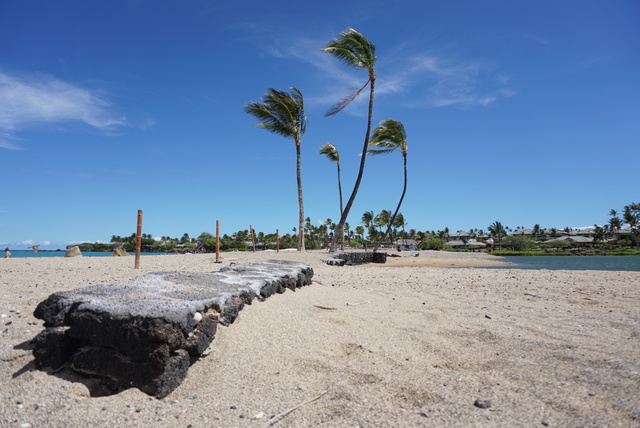WAIKOLOA — More than five years after a tsunami tore into Anaehoomalu Bay, breaching Kuualii pond, crews are expected to begin this month replacing the wall at the fishpond as well as removing sand from the pond to build up the beach.
In March 2011, a tsunami tore a 100-foot-wide gap in the beach at the bay, destroying 220 feet of the rock wall and eroding roughly 9,000 cubic yards of sand, according to a report prepared by Sea Engineering, Inc., the company responsible for repairing the wall. The company said the wall was built in the 1980s.
Damage to the bay was exacerbated during the time it took to get all the required approvals and permits for emergency repair work, which took an additional three months.
The Sea Engineering report indicated that by the time emergency repairs were finished at the beginning of August 2011, the breach had doubled in width to about 200 feet.
Now, efforts are about to begin to replace the entire wall, all the way down to the boulder foundations. Any boulders that are missing or settled below the low-tide mark will be replaced to give crews a stable foundation on which to rebuild.
A 6-foot cement, rubble and masonry wall will then be built on top of the foundation, with 4 feet installed below ground level.
The plan also calls for the sand remaining in the pond, about 800 cubic yards in total, to be removed and placed makai of the new wall for support and protection.
That’s a good plan, said Tamatoa Mamala, 16, who was fishing at Anaehoomalu Bay Saturday morning.
“They should rebuild it,” he said of the wall.
However, he said he’s concerned about what methods are going to be used to rebuild the wall and reclaim the sand. Heavy machinery, he said, could hurt the environment and affect fish in the area.
However, Sea Engineering’s report said “no impacts are expected to the nearshore environments, as the project will not be located in the open coastal waters.”
As for the sand reclamation, Sea Engineering’s report indicates that an excavator will be used to reclaim sand from the fishpond, but the machine will not enter the pond water.
That sand will then be moved along the wall and deposited against the beach side of the wall.
The construction work will cause some closures in the area for approximately 8 to 10 weeks, according to the Waikoloa Land Company.
Starting Aug. 8, beach parking and access will only be available at the North Kolea beach parking lot.
Parking will be allocated on a first-come, first-serve basis. The lot can only accommodate a maximum of 46 vehicles at any one time.
No overflow area will be provided.
Employees and patrons of the Lava Lava Beach Club will still have access via the Kuualii Place beach public access roadway, according to the release.
Comfort stations near the showers and canoe hale at the bay will remain open for visitors and can be accessed from the beach’s north end via a trail behind the fish pond.
The ocean side of Kuualii fishpond will remain closed during the duration of the project.
The large parking lot near the pond will reopen when repairs are completed.
Mamala said he doesn’t think the construction will affect his fishing, saying he can just go elsewhere.
“We’ll find somewhere else,” he said. “There’s always other places where fish can be caught.”
For others though, the construction will have more impact.
Steve Columbo of the Waikoloa Canoe Club said the club had to cancel their annual canoe race scheduled for Aug. 21 because of the beach closure.
“I’m a little disappointed because of the timing,” he said.
The closure will also mean many paddlers won’t be able to get in the water at all to practice.
Columbo also said that while the project is a good plan and restoring the wall an important one, he’s skeptical about whether it will have the impact it’s intended to have.
“I don’t know how you fix mother nature,” he said.
Years ago, he said, crews would build berms every winter at the bay to prevent storms from eroding the beach away.
That, he said, had more of an impact than anything else.
“That was stopping everything from getting our beach pretty eroded,” he said.
However, he said, the project is a good idea and that the Waikoloa Land Company has been “good stewards,” while keeping the canoe club in the loop about plans.
“I really hope for the best and, y’know, prepare for whatever comes,” he said.






